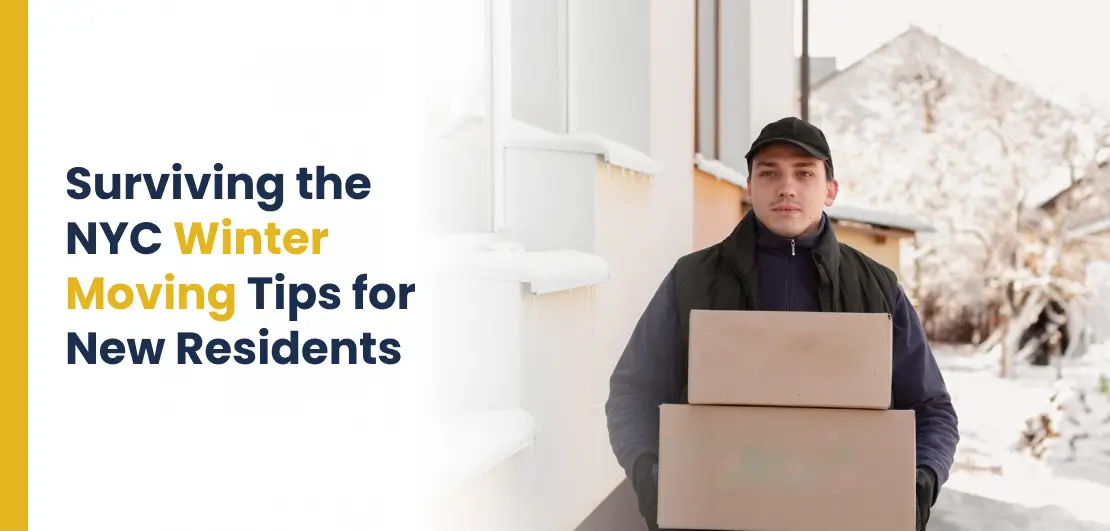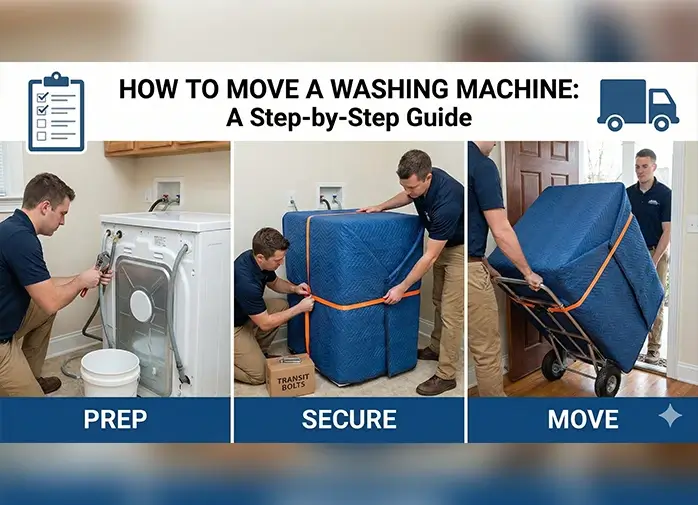Surviving the NYC winter moving tips for new residents

Moving to New York City in Winter: Challenges and Tips
Many people say that moving during the winter months is highly challenging and sometimes feels like a nightmare. Winter in New York City is magical and enchanting. But, for new residents, it might be difficult to adjust. New York City looks like a wonderland during the winter as there are festive vibes around, icy sidewalks, and chilly winds. But if you are new in New York City, you might be having a difficult time as you are new to the place and missing your home. This article can help you find comfort in your new home and enjoy the beauty of NYC in winter.
Moving in winter is challenging in many ways including traffic on the road, snow, and freezing temperatures. But planning a winter move is cost-efficient. You can pick your moving date, and you can hire a mover of your choice. And if you have professionals by your side, you can manage everything and settle easily in the new house.
Follow These Tips to Get Ready for a Winter Move
- Plan your move early: Winter moves require detailed planning, and Van Lines Move suggests that you start the process early. This will give you sufficient time to plan the move considering the delays in the process due to weather conditions. Also, keep the weather conditions in mind while picking the moving date.
- Monitor Weather Conditions: After finalizing the moving date, keep an eye on the weather. Check the weather forecast regularly and pack your belongings according to it. If you find that there will be snow on the moving day, then prepare for a snowy moving day. And if it is supposed to be chilly or rainy, then be ready for that. For different weather conditions, you will need different packing supplies to protect your items from damage.
- Plan your Moving Route: In winter, there are chances that the roads are blocked with snow or might not be safe to travel due to heavy rainfall. So, check the weather and pick the safest route, even if it takes longer hours to reach the destination. Your moving route will ensure the safety of your valuables during the transit.
- Hire Mover with Experience: The best way to plan a winter move to New York City is by hiring a full-service moving company. A team of professionals who have experience in handling the belongings for winter moves will make your transition hassle-free. Moving companies will bring the right packing supply, and they will have moving equipment to remove snow and move items in difficult weather.
- Pack for a winter move: When you move in winter, you need some special supplies to ensure you will remain safe and warm during the transit. Take tools for removing snow like a snow scraper and shovel. Pack some warm clothes, water, and hot beverages to keep you warm. Wear gloves to ensure that your hands will not freeze, and you can hold the heavy boxes with full grip.
- Protect your belongings: For winter moves, packing supplies will be different as you need an extra layer for the boxes to prevent moisture. Once you pack the moving boxes and label them, wrap them with plastic sheets that will save boxes from moisture due to rain or snow.
Tips to Tackle Winters in New York City
Finally, you reach your destination—New York City. You might be feeling excited to enjoy the enchanting aura of the city, but the chilly winter might slow you down. So, after reaching your new home, follow these tips:
- Prepare for chilly winter: Winters in New York City are from December to March, and the temperature can go down to freezing. You need some special winter gear to keep yourself warm in the chilly NYC winters. You will need wool coats and jackets that provide insulation. It is better to get long coats that will cover more of your body. Wear as many layers as you need to beat the cold winds. Other than long coats, don’t forget to get scarves, hats, gloves, and earmuffs. The last but most important thing is winter shoes. Get waterproof and insulated winter boots to prevent slips on icy roads.
- Winter-proof your house: In NYC winters, you need a warm place to sleep. So, after moving into your new house, check if the radiators are working fine or not. If there is some trouble, arrange portable electric heaters to keep the place warm. Also, check the house for winterproofing and use draft stoppers on windows and doors to prevent cold air from seeping in. Make sure the house is warm enough to keep your family healthy. Some people face trouble with cold air like skin dryness and respiratory health problems. In such cases, place a humidifier to add moisture to the house.
- Pick your commute wisely: Commuting across the city in winter is difficult due to heavy snow. The buses and subways will be delayed. If you are driving a car, then it is tough to find a parking spot because the parking rules can be suspended during severe weather. Because of snow on the road, the commute time will be longer, and you should be prepared for that. In case, you plan to walk, be careful and wear boots with good grip.
- Keep yourself healthy: Falling sick is not a good way to start your life in a new place. So, be careful about your health and maintain hygiene. After settling in, get a flu shot against seasonal influenza. The other ways to stay healthy are by eating right and being active.
- Find some entertainment: Feeling homesick is common after you move to a new place. There are several ways to keep yourself entertained and get to know the city. Enjoy the NYC winter and go ice skating at Rockefeller Center and Bryant Park. Plan a day out to Central Park and enjoy snowball fights, building snowmen, and sledding. NYC is known for its cultural scene visit museums, art galleries, theatres, cafes, and bookstores. These are some indoor fun options for everyone. Enjoy local traditions, festivals, events, and local delicacies.
- Destress yourself: The stress of a move does not end with the moving into the new house. It will stay for a few days or months until you feel comfortable in new surroundings. But destressing is also important, so stay connected with your family and friends and try to make new connections. Explore your neighborhood to connect with your neighbors. Several mental health services in NYC can help you if you feel overwhelmed.
- Prepare for emergencies: Weather can surprise you, so keep an eye on the forecast, and be prepared with an emergency kit and pack water, batteries, non-perishable food, and blankets. Connect with local authorities to learn about emergency drills and other related programs.
Conclusion
To survive NYC winters, it is crucial to be prepared and adaptive. You should have the right gear, a winter-proofed house, and a healthy self. It is important for you to feel comfortable and warm to get rid of the moving stress. Be a part of the city, enjoy events and festivities, eat healthy food, enjoy local cuisine, and explore the city. Surviving NYC winters will be easy if you indulge in the culture, start making memories, and gain experiences.
Van Lines Move can make your moving experience relaxed and comfortable. You can stay inside and keep yourself warm while our top moving professional will carry the belongings and drive them to your new house in New York City.
FAQs Related to Surviving the NYC Winter Moving
How do I prepare for NYC snowstorms? To prepare for NYC snowstorms, keep an eye on the weather forecast. Pack your emergency kit and stock your pantry with essentials like non-perishable food, medication, water, and blankets.
How can I connect with the community during winter? You can connect with the community by joining local events, community groups, and social meetups. These groups will help you combat difficult situations.
Are there any tips for driving in Winter? Yes, the first tip is to get new tires with good traction for your vehicle. Be patient and keep some snow removal tools in your car. Get all the updates related to parking regulations and parking suspensions during snowstorms.
Related Articles
Categories
- Long Distance Moving154
- Local Moving120
- Commercial Moving40
- Residential Moving34
- Last – Minute Moving25
- Moving Tips & Lifestyle10
- Furniture Moving9
- Moving Tips & How-To Guides8
- Moving services7
- Moving Cost5
- Moving Cost Calculator5
- Moving Costs & Budgeting5
- moving tips4
- state to state movers4
- Piano Moving3
- Car Transportation3
- Truck Rental3
- Local Move3
- Moving companies3
- best moving rates3
- cheap moving companies3
- affordable moving companies3
- full-service movers3
- Moving3
- Moving Tips3
- Moving Cost Guides3
- Junk Removal2
- Moving Container2
- Senior Moving2
- Senior Relocation Moving Companies2
- Moving Tools2
- Moving Estimates2
- interstate moving2
- College Moving2
- Dorm Moving2
- Tips for moving2
- cross-country move2
- International moving2
- Household moving2
- Relocation Guide2
- Moving Tips & State Guides2
- Moving Tips & Planning2
- Heavy Equipment1
- Senior Moving Services1
- office moving1
- office relocation1
- employee relocation1
- Car Transport1
- Vehicle Shipping1
- Car Shipping Services1
- Artificial Intelligence1
- Office Moving Services1
- Commercial Moving Companies1
- Corporate Moving Services1
- Corporate Movers1
- full-service moving companies1
- sustainable moving companies1
- green movers1
- Moving in US1
- Best places to move in 20251
- 2025 moving1
- Full-Service Moving Companies1
- College moving services1
- Moving to College1
- Moving Season1
- Spring Moving1
- donate1
- sell1
- Movers in California1
- Movers in Studio City1
- Moving to California1
- Laws about Moving into California1
- Moving Laws1
- House moving1
- packing1
- cheap moving ways1
- Moving guide1
- moving across countries1
- international relocation program1
- move out cleaning1
- right packing supplies1
- pack while moving1
- Apartment moving1
- PODS1
- moving out1
- state to state move1
- California movers1
- Truck Rental1
- US Territory Relocation1
- International Moving1
- Long-Distance Moving1
- Shipping & Moving Tips1
- Moving Budget Guide1
- Relocation Guides & Incentives1
- Moving Tools & Equipment Guides1
- Moving Services & Options1
- Moving Tips & How-To Guides1
- Moving Day & Settling In1
- Mobile Home Moving1
- Moving Guide & Tips1
- Moving Tips & State Comparisons1
- Moving Tips & City Guides1
- Moving Tips & Cost Guides1
- Long-Distance Moving Tips1
- Moving Tips & Financial Planning1
- Moving Tips & Home Preparation1
- Vehicle Shipping & Auto Transport1
- Marketing & Lead Generation1
- International Moving Guides1
- Moving Costs1
- San Francisco Moving Guide1
- NYC Moving1
- Local Movers1
- Budget Moving1
- Student Moving1
- Affordable Moving1
- Specialty Moving Guides1
- Local & Long-Distance Moving1
- Boston Moving Guide1
- Europe Relocation Guide1
- Moving Costs & Specialty Moving1
- Cost of Living1
- Relocation1
- International Moving1
- Moving Guides1
- Lifestyle & Relocation1
- State Guides1
- Home Buying Guide1
- Moving Timeline1
- Real Estate Tips1
- Appliance Moving1
- Packing & Preparation1
- Interstate Relocation1
- City-to-City Moving Guide1

 Local Movers
Local Movers Last-Minute Movers
Last-Minute Movers Junk Removal
Junk Removal Long Distance Movers
Long Distance Movers Piano Movers
Piano Movers Heavy Equipment
Heavy Equipment Commercial Movers
Commercial Movers Moving Container
Moving Container Car Transportation
Car Transportation Furniture Movers
Furniture Movers Truck Rental
Truck Rental Moving Cost Calculator
Moving Cost Calculator Moving Planner
Moving Planner Packing Calculator
Packing Calculator Moving Checklist
Moving Checklist Moving Insurance
Moving Insurance FAQ
FAQ Contact Us
Contact Us Moving Loan
Moving Loan About Us
About Us











